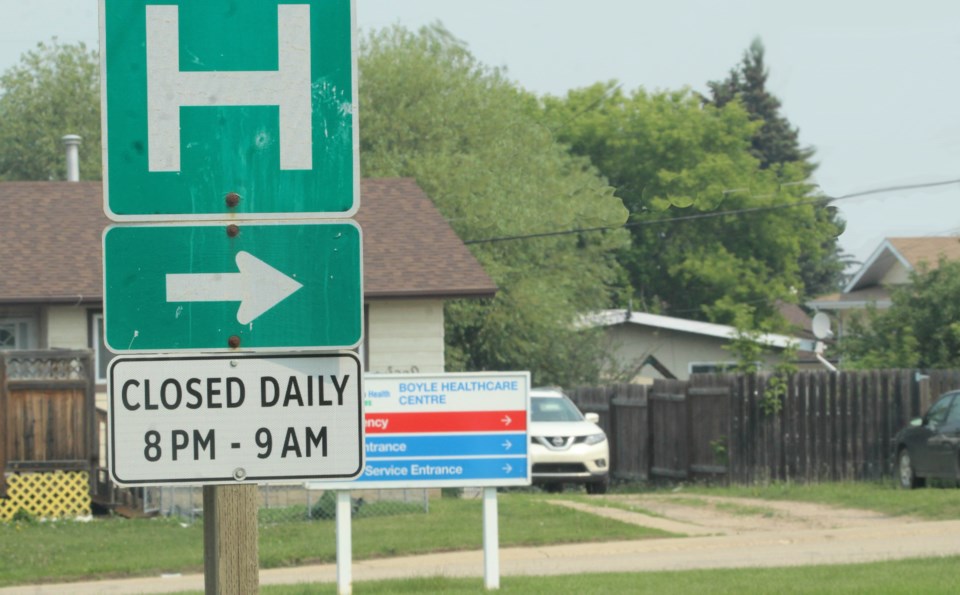BOYLE – July 1 marked the two-year anniversary of the Boyle Healthcare Centre’s (BHC) emergency department’s reduced operating hours, but Alberta Health Services maintains it is working to keep the hospital open and restore it to full operation.
“At this time, we aren’t in a position to re-open, and that falls back on the RN (Registered Nurse) vacancies that continue to exist,” said Christine Schmelzle who manages both Athabasca and Boyle’s healthcare centres. Schmelzle was joined by clinical manager John Burton for a presentation to Athabasca County councillors during their June 27 meeting.
The BHC is a bit different than a normal hospital — AHS calls it a single RN facility, meaning the RN is operating without a physician on site.
“That responsibility is huge,” said Schmelzle. “It's terrifying for me as an RN to know I would have to run a hospital by myself.”
Throughout the process, municipal leaders like Boyle’s Mayor Colin Derko said they’ve understood the issues AHS is dealing with, but that hasn’t made it any less frustrating.
“When we hit the six-month mark, the health minister at the time was Jason Copping,” said Derko. “We both agreed that six months was absolutely unacceptable. Here we are at two years, and its seemingly acceptable.”
Lana Hataley oversees AHS’s operations in the rural central part of the province, which includes Boyle and Athabasca. She said there was no firm timeline for re-opening the BHC, but she added they were hopeful it could resume regular operation in mid-winter.
AHS’s proposed solution for the nursing shortage pilot program that brought over internationally educated nurses (IENs) from around the world. Once the nurses got to Alberta, they had eight-to-12 weeks of supported practice before AHS expected they would be able to write their licensing exam —the NCLEX — and go out on their own. Boyle currently has one IEN that arrived in December and is still training before they re-write the exam. The other IEN returned home after failing to pass the NCLEX.
“We’ve learned a lot since the initial arrivals of the first IENs,” said Lana Hataley, AHS’s senior operating officer for the rural central region. “The program has continued to evolve and develop, and it has made tremendous progress.”
The Boyle hospital will be receiving another IEN in the fall, but in the meantime there’s nothing that can be done to fill the shortages. Each IEN’s immigration status is tied to the respective job posting, and Schmelzle said AHS is unable to hire into the position in the meantime.
“It’s like we’re a victim of bullshit, for lack of a better word,” said Derko. “How about some commonsense approaches here where we actually put the people first instead of the process.
“People are literally dying. People are very uncomfortable with their health care system right now.”
The hospital’s nighttime closure has impacted community groups as well. Boyle’s Ag Society runs bi-weekly roughstock nights in the summer where young rodeo athletes can get some practice in the arena, but that comes with risks.
“There are different events like that where there is quite a possibility of somebody getting injured,” said society president Ashtin Anderson, who also sits on Athabasca County’s council. “We try very hard to have them wrapped up and done with before the hospital closes, just in case.”
How did we get here?
Initially, AHS had hoped the closure would be temporary. Following the July 1, 2022, closure, Derko told the Athabasca Advocate, “I worry that perhaps one month turns into two months, turns into three months, and maybe even more.”
Those worries turned out to be well founded. AHS held a town hall on Feb. 8, 2023, where they provided the community with an update on the facility, which was attended by representatives from all three local municipalities, as well as MLA Glenn van Dijken and about 350 residents.
A mid-July 2023 meeting between AHS and the leaders of Athabasca County, the Village of Boyle, and the Town of Athabasca provided confirmation that the nurses had been hired, but were being held up by paperwork.
During a March council meeting earlier this year, Boyle’s representative on the regional healthcare attraction and retention committee told her fellow councillors the nurses would be delayed further in starting after their first attempt at the NCLEX. According to the Canadian Council of Registered Nurses, the internationally educated pass rate for first-time writers around 60 per cent, depending on the year. That goes down to the mid-40s for second time writers, and tends to drop again for third, and then fourth-or-more time applicants.
“I think the expectations for what the IEN program was supposed to be, and what it turned out to be, were very different, and that’s nobody’s fault,” said Derko. “I’m quite happy about the decision they made because I agree that we can’t sacrifice the level of service.
“It’s not that (the IENs) aren’t good, they just need the training and it takes time. A kid coming out high school might be a great nurse, but they still need to go through school for four years.”




